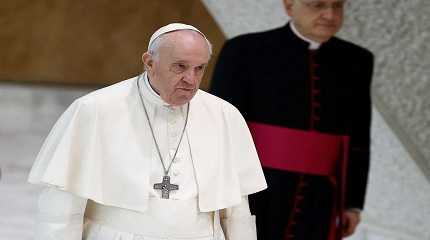
VATICAN CITY, March 6 (Reuters) - Pope Francis on Sunday rejected Russia's use of the term "special military operation" for its invasion of Ukraine, saying the country was being battered by war and urging an immediate end to the fighting.
"In Ukraine, rivers of blood and tears are flowing. This is not just a military operation but a war which sows death, destruction and misery," the pope said in his weekly address to crowds gathered in St. Peter's Square.
The comments were the strongest the pope had yet made about the violence although, as has been the case throughout the conflict, he did not condemn Russia by name.
Instead, he repeated his appeal for peace, the creation of humanitarian corridors and a return to negotiations.
"In that martyred country the need for humanitarian assistance is growing by the hour," the pope said, speaking from a window overlooking the square. "War is madness, please stop."
The day after Russia launched its invasion, Francis went in person to the Russian embassy to relay his concern - an unprecedented departure from usual diplomatic protocol.
Russia says its military operation is not designed to occupy territory but to destroy Ukraine's military capabilities and capture what it regards as its dangerous nationalist rulers.
Many more people than usual gathered in front of St. Peter's Basilica for the pope's Sunday appearance, some holding multi-coloured peace flags as well as the blue and yellow flag of Ukraine.
"The Holy See is willing to do everything to put itself at the service of peace," the pope said, adding that two Roman Catholic cardinals had gone to Ukraine to help those in need -- Konrad Krajewski from Poland and Canada's Michael Czerny.
Andriy Yurash, Ukraine's ambassador to the Vatican, told Reuters he was "very, very happy" that Francis had called the conflict a war.
"Even if the pope did not say the word 'Russia', everyone in the world knows who the aggressor that invaded us is and who started this unprovoked war," he said.
The pope also made a point of thanking reporters who were covering the fighting despite the dangers, to report on the cruelty and suffering being experienced.




